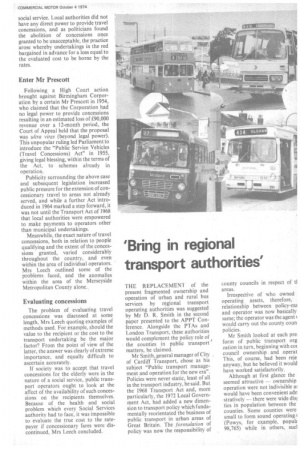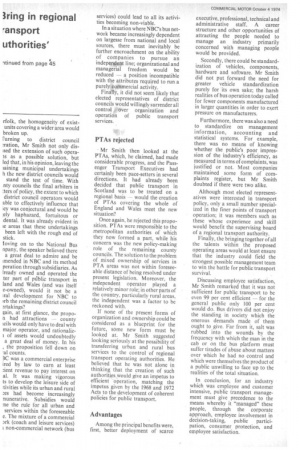'Bring in regional transport authorities'
Page 47

Page 48

If you've noticed an error in this article please click here to report it so we can fix it.
THE REPLACEMENT of the present fragmented ownership and operation of urban and rural bus services by regional transport operating authorities was suggested by Mr D. R. Smith in the second paper presented to the APPT Conference. Alongside the PTAs and London Transport, these authorities would complement the policy role of the counties in public transport matters, he claimed.
Mr Smith, general manager of City of Cardiff Transport, chose as his subject "Public transport management and operation for the new era". Policies were never static, least of all in the transport industry, he said. But the 1968 Transport Act and, more particularly, the 1972 Local Government Act, had added a new dimension to transport policy which fundamentally reorientated the business of public transport in urban areas of Great Britain. The formulation of policy was now the responsibility of county councils in respect of ti areas.
Irrespective of who owned operating assets, therefore, relationship between policy-ma and operator was now basically same; the operator was the agent would carry out the county coun policies.
Mr Smith looked at each pre, form of public transport org zation in turn, beginning with cot council ownership and operat This, of course, had been reje anyway, but he believed it would have worked satisfactorily.
Although at first glance the seemed attractive — ownership operation were not indivisible ai would have been convenient adn stratively — there were wide disj ties in population between the counties. Some counties were small to form sound operating (Powys, for example, populE 98,765) while in others, sucl rfolk, the homogeneity of existunits covering a wider area would broken up.
Fuming to district council ;ration, Mr Smith not only dissed the extension of such operais as a possible solution, but led that, in his opinion, leaving the mining municipal undertakings h the new district councils would stand the test of time. With nty councils the final arbiters in lers of policy, the extent to which district council operators would able to effectively influence that Ley was conjectural and would be ;ely haphazard, fortuitous or dental. It was already evident in ie areas that these undertakings been left with the rough end of stick.
loving on to the National Bus npany, the speaker believed there a great deal to admire and be [mended in NBC and its method peration through subsidiaries. As !ready owned and operated the ter part of public transport in land and Wales (and was itself e-owned), would it not be a Lral development for NBC to rb the remaining district council rtakings?
gain, at first glance, the propon had attractions — county icils would only have to deal with major operator, and rationaliz1 of assets would undoubtedly a great deal of money. In his , the proposition fell down on -al counts.
3C was a commercial enterprise ired by law to earn at least :lent revenue to pay interest on al. It was making vigorous ts to develop the leisure side of ;tivities while its urban and rural :es had become increasingly nunerative. Subsidies would ne the rule for all urban and services within the foreseeable e. The mixture of a commercial 3rk (coach and leisure services) i non-commercial network (bus services) could lead to all its activities becoming non-viable.
In a situation where NBC's bus network became increasingly dependent on largesse from national and local sources, there must inevitably be further encroachment on the ability of companies to pursue an indeponitgAt line; organizational and managerial freedom would be reduced — a position incompatible with the attributes required to run a purely commercial activity.
Finally, it did not seem likely that elected representatives of district councils would willingly surrender all control over organization and operation of public transport services.
PTAs rejected
• Mr Smith then looked at the PTAs, which, he claimed, had made considerable progress, and the Passenger Transport Executives had certainly been pace-setters in several directions. It had already been decided that public transport in Scotland was to be treated on a regional basis — would the creation of PTAs covering the whole of England and Wales meet the new situation?
Once again, he rejected this proposition. PTAs were responsible to the metropolitan authorities of which they now formed a part, while his concern was the new policy-making role of the remaining county councils. The solution to the problem of mixed ownership of services in PTA areas was not within foreseeable distance of being resolved under present legislation. Moreover, the independent operator played a relatively minor role; in other parts of the country, particularly rural areas, the independent was a factor to be reckoned with.
If none of the present forms of organization and ownership could be considered as a blueprint for the future, some new form must be looked at. Mr Smith suggested looking seriously at the possibility of transferring urban and rural bus services to the control of regional transport operating authorities. He believed that he was not alone in thinking that the creation of such authorities would give an impetus to efficient operation, matching the impetus given by the 1968 and 1972 Acts to the development of coherent policies for public transport.
Advantages
Among the principal benefits were, first, better deployment of scarce executive, professional, technical and administrative staff. A career structure and other opportunities of attracting the people needed to manage an industry primarily concerned with managing people would be provided.
Secondly, there could be standardization of vehicles, components, hardware and software. Mr Smith did not put forward the need for greater vehicle standardization purely for Its own sake; the harsh realities of bus operation today called for fewer components manufactured in larger quantities in order to exert pressure on manufacturers.
Furthermore, there was also a need to standardize on management information, accounting and statistical systems. For example, there was no means of knowing whether the public's poor impression of the industry's efficiency, as measured in terms of complaints, was justified or not. Most companies maintained some form of complaints register, but Mr Smith doubted if there were two alike.
Although most elected representatives were interested in transport policy, only a small number specialized in the finer points of transport operation; it was members such as these whose experience and skill would benefit the supervising board of a regional transport authority.
Finally, the bringing together of all the talents within the proposed operating areas would at least ensure that the industry could field the strongest possible management team to win the battle for public transport survival.
Discussing employee satisfaction, Mr Smith remarked that it was not sufficient for public transport to be even 99 per cent efficient — for the general public only 100 per cent would do. Bus drivers did not enjoy the standing in society which the onerous demands made of them ought to give. Far from it, salt was rubbed into the wounds by the frequency with which the man in the cab or on the bus platform must suffer tirades of abuse about matters over which he had no control and which were themselves the product of a public unwilling to face up to the realities of the total situation.
In conclusion, for an industry which was employee and customer intensive, public transport management must give precedence to the means whereby it "managed" these people, through the corporate approach, employee involvement in decision-taking, public participation, consumer protection, and employee satisfaction.












































































































